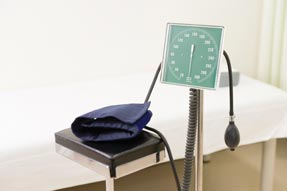March 2016

Shifting standards for hypertension
New hypertension guidelines are being developed by the American Heart Association (AHA) and the American College of Cardiology (ACC) that will incorporate new study results. At issue is how these results apply to the many types of patients who walk through the office door, including those with diabetes.
Integrative therapies may complement care
A growing base of evidence suggests that certain treatments may have a place in physicians' repertoires as part of a holistic approach to health.
Primary care has growing role in colorectal cancer follow-up
Increased attention to transitioning colorectal cancer patients who have completed their treatment back into the care of their primary care clinicians is increasingly important in the face of a shortage in the oncology workforce.
Managing Alzheimer's disease when options are limited
Primary care physicians can expect to diagnose an increasing number of patients with Alzheimer's disease as the U.S. population ages. While clinicians have been more successful in diagnosing the disease early, effective treatments or prevention options are more scarce.
Web-based therapy may help interns with suicidal ideation
Resident physicians are at high risk for depression, and training can make the situation much worse. In an effort to prevent suicidal ideation among interns, researchers tested a Web-based cognitive behavioral therapy (CBT) intervention.
ACP helps transform practices to value-based care
ACP is 1 of 10 Support and Alignment Networks that received grants from the Centers for Medicare and Medicaid Services to support physicians as they improve patients' experience of care, improve the health of populations, and reduce the per capita cost of health care through the expansion of quality improvement capacity.
From policy to results: How does it all come together?
The process by which advocacy organizations achieve results for their members can seem opaque to those who are not directly involved. How does advocacy really work?.
SPRINT prompts new debate on BP targets
This issue covers topics such as management of hypertension, integrative medicine, and follow-up care for colorectal cancer.
Transform to get ahead of the payment reform curve
Value-based payments are on the horizon, and practices need to prepare. There are very worthwhile reasons for getting ahead of the payment reform curve.
Warning about different doses for 2 forms of posaconazole
This update covers a warning that differences in dosing regimens between the 2 oral formulations of posaconazole (Noxafil) have resulted in dosing errors.
Officers and Regents election results announced
The election of Officers and Regents has been completed. Terms become effective at the conclusion of the Annual Business Meeting at Internal Medicine Meeting 2016 in Washington, D.C.
Internal Medicine Meeting 2016 covers clinical questions
Internists working to implement best practices on complicated topics will find a wealth of advice at Internal Medicine Meeting 2016, to be held May 5-7 at the Walter E. Washington Convention Center in Washington, D.C.
Chapter awards
Chapters honor Members, Fellows, and Masters of ACP who have demonstrated by their example and conduct an abiding commitment to excellence in medical care, education, research, or service to their community, their chapter, and ACP.
MKSAP Quiz: 3-month history of rash
A 46-year-old woman is evaluated for a 3-month history of a rash during the summertime. She is otherwise well and takes no medications. Following a physical exam, exam of the rash, and lab studies, what is the most likely diagnosis?.
